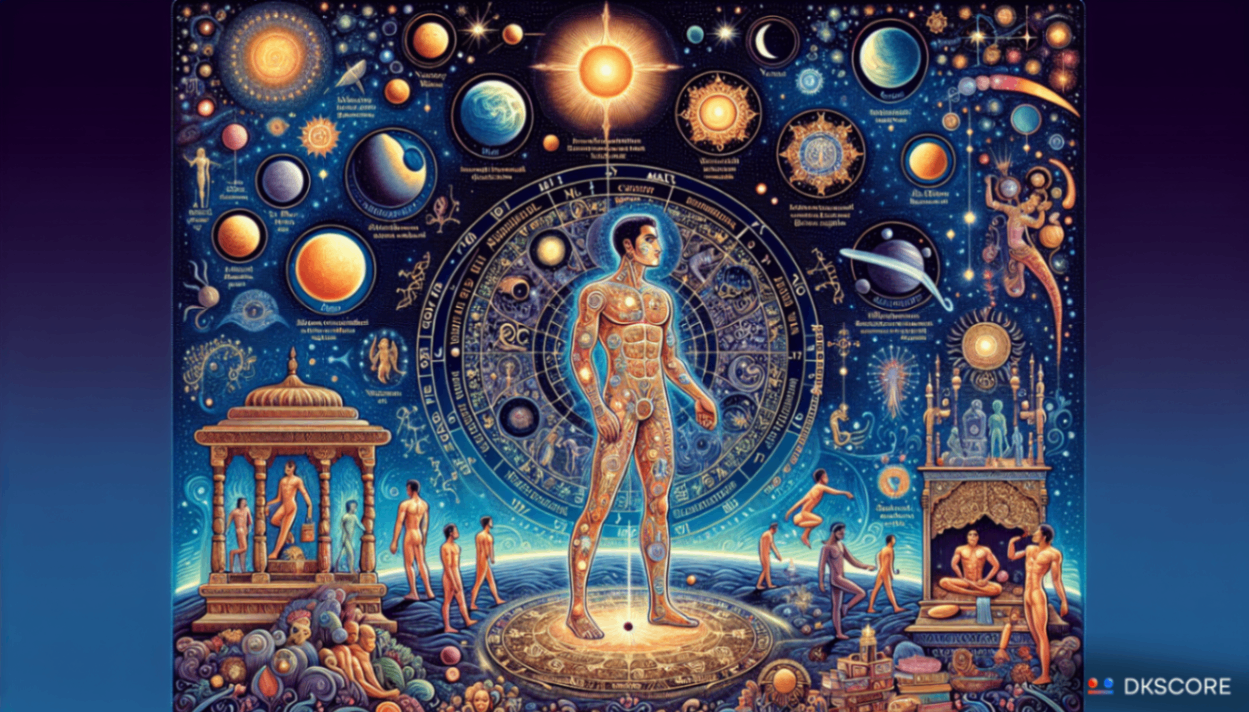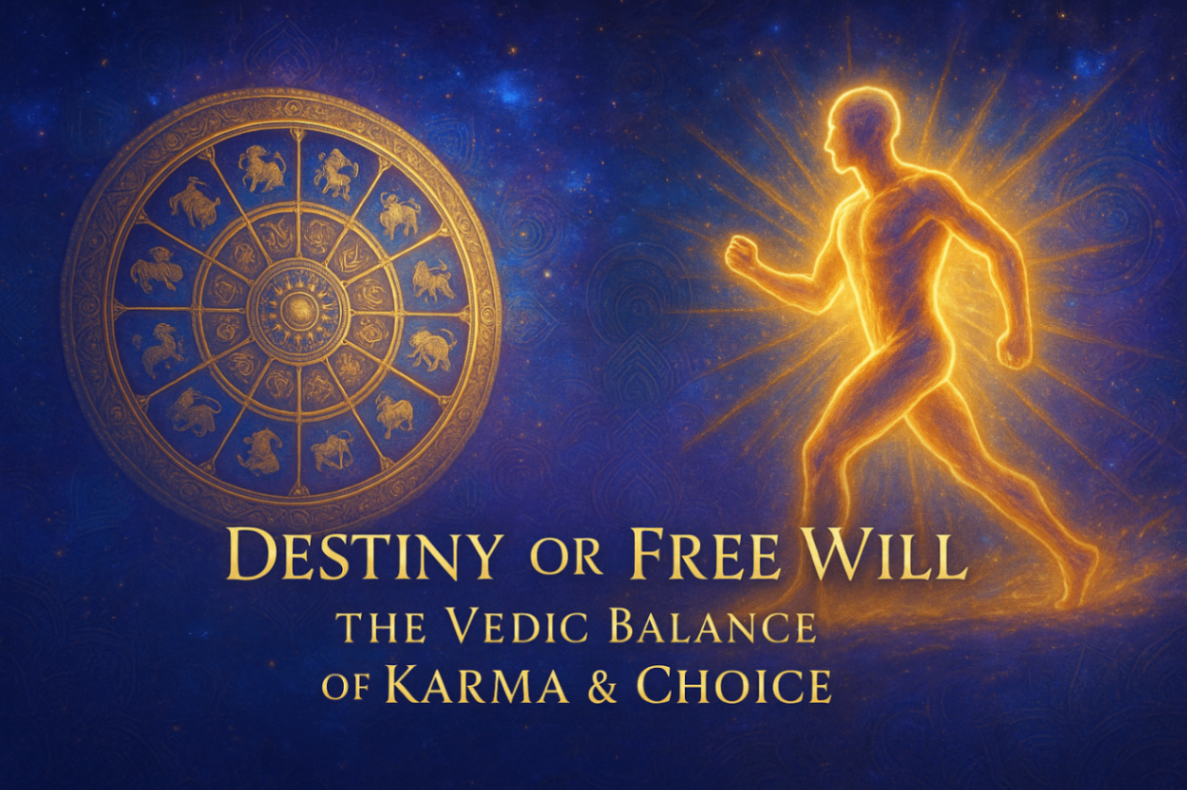Introduction
Vedic astrology is a profound system that looks at planetary influences on our lives. It weaves together celestial energies and human consciousness. At the same time, the ancient texts called the Upanishads explore the nature of reality, self-awareness, and the profound bond between individual beings and the universe. When we blend these two perspectives, we find new ways to understand destiny, character, and the power of our thoughts.

The phrase “Yad Bhavam Tad Bhavati” appears in the Mundaka Upanishad and translates to “As you think, so you become.” This teaching highlights the transformative power of our inner world. By examining our thoughts, we can see how they shape our speech, actions, and overall life path. In Vedic astrology, our mental and spiritual energies also align with planets that govern how these energies flow and manifest. This article delves into the Upanishadic wisdom of “Yad Bhavam Tad Bhavati,” links it to planetary energies, and offers practical insights for daily life.
Unveiling the Upanishadic Perspective

Many people ask what is upanishad when they first encounter this vast field of Indian philosophy. The word derives from Sanskrit and is often interpreted as “sitting down near” a teacher to gain sacred knowledge. This points to a tradition of close mentorship and introspection. Scholars debate how many upanishads are there, but the most widely accepted number is 108. These sacred scriptures carry layers of teachings on the nature of the self, the universe, and the ultimate reality known as Brahman.
If you are curious about who wrote upanishads, there is no single author. Instead, ancient sages passed down their insights through oral tradition. Over time, these teachings were compiled into texts that explore deep philosophical questions. Many wonder what were the questions that upanishadic thinkers wanted to answer. They sought the meaning of life, the nature of consciousness, the relationship between the individual soul (Atman) and the cosmic spirit (Brahman), and how knowledge of these truths could free a person from suffering. In essence, what is the meaning of upanishad lies in its role as a guide to spiritual insight and liberation.
Today, these teachings have found new life in various forms. Productions like upanishad ganga present them through storytelling and dramatizations. Yet the core remains the same: The upanishads meaning is a journey inward, discovering the innermost reality that connects us to the cosmos. This universal quest aligns with the core premise of Vedic astrology, which also examines the relationship between the individual and the larger celestial design.
Yad Bhavam Tad Bhavati: The Transformational Phrase

In its simplest form, “Yad Bhavam Tad Bhavati” urges us to watch our thoughts closely. Thoughts are subtle energies that, over time, become words, actions, habits, character, and finally destiny. This chain of transformation is central to many philosophical traditions, but the Upanishadic texts articulate it in a concise and powerful way.
Here is a timeless verse that captures this flow:
Watch your thoughts, for they will become words.
Watch your words, for they will become actions.
Watch your actions, for they will become habits.
Watch your habits, for they will become character.
Watch your character, for it will become your destiny.
When we examine these lines through the lens of Vedic astrology, each step in this process resonates with specific planetary energies. That cosmic lens helps us see how subtle vibrations in our minds can ripple outward and shape our larger life journey.
Planetary Influences in Vedic Astrology

Vedic astrology assigns different areas of life to particular planets. Mercury governs communication. Mars energizes action and courage. The Moon shapes our emotions, while Venus adds harmony and pleasure. The Sun stands for the core self, and Saturn tests us with discipline and challenges. Jupiter expands our outlook, offering wisdom and spiritual growth. These planetary powers align elegantly with the path from thought to destiny.
Thoughts Become Words (Mercury)
Our internal dialogue takes shape through Mercury’s domain. Mercury rules intelligence, logic, and communication. Positive thinking sparks uplifting conversations and creative ideas. Negative thinking, on the other hand, can color our speech with criticism or hostility. By consciously refining our thoughts, we cultivate healthy dialogue. This simple shift in mindset can dramatically affect how we express ourselves and how others perceive us.
Words Become Actions (Mars)
Once thoughts and words solidify, they often lead to action. Mars channels our energy, courage, and drive. When we speak with clarity and purpose, Mars transforms our words into focused endeavors. But if our words are scattered or impulsive, we may act with haste and regret. Aligning with Mars in a balanced way means combining passion with foresight. Over time, this creates a steady momentum that propels us toward our goals.
Actions Become Habits (Moon and Venus)
Our repeated actions turn into habits, and this phase is influenced by the Moon and Venus. The Moon governs our emotional patterns and subconscious drives. It shapes how we react to life’s circumstances. Meanwhile, Venus introduces the principles of harmony, love, and pleasure. Positive habits that resonate with our emotional and aesthetic values create a supportive lifestyle. Negative or self-destructive patterns, however, can derail progress and lead to emotional turbulence. Harnessing the energies of the Moon and Venus means understanding our emotional needs and surrounding ourselves with experiences that cultivate joy and equilibrium.
Habits Become Character (Sun and Saturn)
Long-held habits eventually mold our character. This is where the Sun and Saturn come in. The Sun represents our essential identity and inner strength. It governs our sense of purpose and how we shine in the world. Saturn, on the other hand, imposes discipline and tests us through karmic lessons. Together, these planets shape who we become over time. If we respond to Saturn’s challenges with perseverance, and if we channel the Sun’s light with confidence, our character gains depth and reliability. We learn to face obstacles with resilience and integrity.
Character Becomes Destiny (Jupiter)
Our final stage connects character to destiny. Jupiter, the planet of expansion and wisdom, guides us here. It rewards us with opportunities that resonate with the quality of our character. A virtuous or well-formed character draws in positive circumstances and supportive networks. When our character needs further refinement, Jupiter may present tests that nudge us toward deeper learning. This expansive force ensures we continue to evolve, both spiritually and materially, in alignment with cosmic rhythms.
Connecting Mind and Destiny
The sequence Mercury → Mars → Moon/Venus → Sun/Saturn → Jupiter maps onto “Yad Bhavam Tad Bhavati.” By working consciously with each planetary energy, we can align our internal development with universal forces. If we keep our thoughts intentional, our words and actions become purposeful. Over time, these consistent, meaningful actions shape our habits and character. Eventually, they pave the way for the destiny that matches our inner state.
This approach underscores one of the most profound insights in what were the questions that upanishadic thinkers wanted to answer. They wondered about the connection between thought, self, and the unfolding of life events. As we study this cosmic chain of influences, we see that our inner world and external destiny are deeply linked. We also realize that we can shift our path by changing our thoughts and refining our character.
Practical Insights for Daily Life
Anyone can apply these principles. You do not need to be a scholar of the Upanishads or a seasoned astrologer to see results. Simple daily practices help us tune into the planets and our internal state.
– Mercury: Begin each day with mindful affirmations. Notice how you speak to yourself and others. If you spot negative self-talk, reframe it gently.
– Mars: Plan actions with intention. Before you act, pause and ask if this is aligned with your true goals. Over time, disciplined choices amplify your courage and determination.
– Moon and Venus: Observe how daily routines make you feel. If you notice emotional tension, tweak your habits to add more calm and enjoyment. This can be as simple as a few minutes of meditation or a quiet walk.
– Sun and Saturn: Embrace challenges as ways to deepen your strength of character. If you face a setback, ask what lesson Saturn might be teaching you. Then shine with the Sun’s energy by keeping your sense of purpose alive.
– Jupiter: Reflect on your growth regularly. A quick journal entry can track your progress. Notice where you have improved and where you still need work. Trust that Jupiter’s blessings will guide you toward the right opportunities.
Blending Vedic Astrology with Upanishadic Wisdom
Vedic astrology focuses on cosmic influences, but it never robs us of free will. It shows patterns, tendencies, and lessons. The Upanishadic teachings remind us that our inner world is just as powerful in shaping reality. By holding both views together, we see a dynamic interplay: cosmic forces guide us, but our thoughts, words, and actions steer the ship.
While many people ask how many upanishads are there or seek to explore upanishad ganga, it is equally important to apply these teachings in a practical way. Over time, studying the synergy between planetary energies and your own mindset can spark genuine transformation. “Yad Bhavam Tad Bhavati” remains central: the cosmos mirrors our internal vibration.
Reflections on Karma and Dharma
In Vedic tradition, the concepts of karma and dharma also merge seamlessly with Upanishadic insights. Karma refers to the fruits of past actions, while dharma is the path of righteous conduct. When we align our thoughts and habits with dharma, we minimize negative karma and heighten the positive. This alignment makes our spiritual journey smoother and more fulfilling.
The Upanishads delve deeply into the question of self-realization. That journey is not separate from daily life. It unfolds in our thoughts, speech, and actions. Astrology can help us navigate karmic patterns. The Upanishadic vision guides us in refining our inner world so that we resonate with higher truths. This balance is key to living with purpose and harmony.
A New Perspective on “What is Upanishad”
When exploring what is upanishad, we see that these texts offer practical wisdom. They are not just abstract philosophies locked away in ancient manuscripts. The upanishads meaning lies in transformation. They teach us to look within and find the deep connection between the individual self and the cosmic reality. Vedic astrology also shows that our destiny is not fixed in stone but shaped by how we engage with planetary energies.
This relationship between personal initiative and cosmic support forms a powerful framework. We become co-creators of our destiny. By merging Upanishadic teachings with astrological insights, we can refine our focus, understand our inherent patterns, and chart a life path brimming with authenticity and spiritual growth.
Conclusion: Embrace the Cosmic Connection
“Yad Bhavam Tad Bhavati” is an eternal reminder that our inner life shapes our outer reality. The Upanishadic perspective tells us that by changing our thought patterns, we can alter our destiny. Vedic astrology, on the other hand, shows how celestial forces guide each step of this journey. As we cultivate positive thoughts, intentions, and habits, we work in harmony with the planets that govern each stage of transformation.
If you have ever wondered who wrote upanishads or questioned what is the meaning of upanishad, know that these texts are the collective wisdom of ancient sages. They aimed to illuminate the secret link between mind and cosmos. Their insights speak directly to the world of modern seekers, offering a path that is both universal and deeply personal.
Step by step, we can align with Mercury’s clarity of mind, Mars’ fearless action, the Moon and Venus’ nurturing presence, the Sun and Saturn’s shaping force, and Jupiter’s guiding wisdom. Each stage unfolds from our thoughts, shaping words, actions, and destiny. When we live with awareness, we step into the cosmic dance, discover our true character, and pave the way for a destiny defined by growth and fulfillment.
In the end, “As you think, so you become” is not just a phrase but a living mantra. Let it inspire your daily life. Embrace the synergy of Upanishadic wisdom and Vedic astrology. As your thoughts evolve, your entire life will reflect that transformation, echoing the timeless truth of “Yad Bhavam Tad Bhavati.”




















